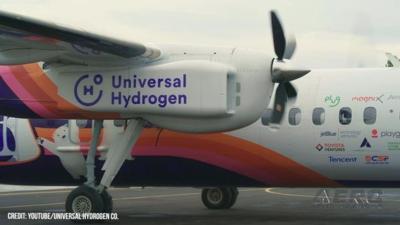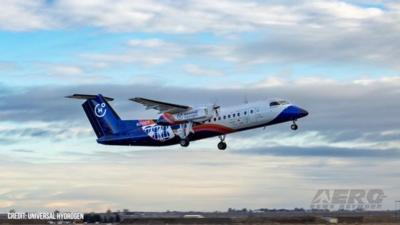Universal Hydrogen Chooses Hartzell Props for Test Aircraft
On the morning of 02 March 2023 Universal Hydrogen—the California energy concern about the commendable endeavor of making hydrogen-powered commercial flight a near-term reality—flew a De Havilland Dash 8-300 regional airliner under partial, hydrogen fuel-cell propulsion. The test aircraft—dubbed Lightning McClean—lifted off from central Washington State’s Grant County International Airport (MWH) at 08:14 PST and flew for 15 minutes, reaching an altitude of 3,500-feet MSL.

In preparation for the test-flight, Lightning McClean’s conventional, jet-fuel-burning, number-two (starboard) engine was replaced by a hydrogen-electric powertrain comprising Plug Power’s ProGen fuel-cells specially modified for aviation use, and Everett, Washington-based MagniX’s megawatt-class Magni650 electric propulsion unit. The Dash 8’s left engine, however, remained the 2,380-shaft-horsepower Pratt & Whitney PW123 turboprop mill originally envisaged for the aircraft by Bombardier. The conventional turboprop engine’s proven reliability offset the variables of the experimental hydrogen-electric architecture, thereby affording the endeavor a key degree of safety-critical redundancy.
The hydrogen-electric engine was mated to a custom-built Hartzell 91-inch-diameter, five-blade, swept airfoil, carbon-fiber propeller. Though smaller than the standard Dash 8 propeller, Hartzell’s unique screw—which comprised blades, hub, and retention components deriving of an existing 14 CFR Part 35 certified propeller—produced thrust enough to keep Lightning McClean airborne when the aircraft’s jet-fuel-powered portside engine was throttled back during flight.
Hartzell, which also customized a propeller-governor for Lightning McClean—continues to develop governor advancements for green-powered aircraft.
Hartzell Propeller President J.J. Frigge stated: “This project with Universal Hydrogen is one of many programs where Hartzell Propeller is working with and supporting advanced air mobility manufacturers. Hartzell Propeller has been around for over a hundred years, and carbon-free flight can power our next century.”
Mr. Frigge added: “We’ve been working with this team for almost two-years as we step up our investments working on future new aircraft design opportunities. Hartzell Propeller is pleased to be a part of this historic first flight of a hydrogen fuel-cell-powered regional airliner.”
The test-flight was conducted under an FAA Special Airworthiness Certificate and occasioned the first sortie of a flight-test campaign Universal Hydrogen expects to culminate with the 2025 entry into passenger service of an ATR-72 regional airliner converted to run on hydrogen. Representatives of the U.S. and European launch customers for the hydrogen airplanes—Connect Airlines and Amelia, respectively—were on-hand to witness the historic flight.
The milestone flight was piloted by Universal Hydrogen and former U.S. Air Force test pilot Alex Kroll, who stated: “During the second circuit over the airport, we were comfortable with the performance of the hydrogen powertrain; so we were able to throttle back the fossil fuel turbine engine to demonstrate cruise principally on hydrogen power. The airplane handled beautifully, and the noise and vibrations from the fuel-cell powertrain are significantly lower than from the conventional turbine engine.”
Among the unique aspects of Universal Hydrogen’s powertrain design is the fact it utilizes no batteries. Rather, fuel-cells drive the electric motor directly—drastically reducing system weight and operational costs.
AeroTEC, a Seattle-based engineering concern specializing in the development, testing, and certification of new aerospace products, assisted with test aircraft’s conversion to hydrogen fuel-cell power. The company designed Lightning McClean’s modified nacelle structure and performed numerous additional alterations by which the Dash-8 was successfully retrofitted with Universal Hydrogen’s powertrain. The entirety of the conversion work was completed in less than 12-months.
The test flight followed a successful December 2022 demonstration of Universal Hydrogen’s modular hydrogen logistics system. Subject demonstration was conducted at the company’s engineering center in Toulouse, France.
Universal Hydrogen co-founder and CEO Pal Eremenko set forth: “Our business model resolves the chicken-and-egg problem between hydrogen airplanes and hydrogen infrastructure by developing both in parallel and with a uniquely low-cost approach. The airplanes are converted to hydrogen using an aftermarket retrofit conversion kit, tackling the existing fleet rather than developing a brand new airplane. And hydrogen fueling uses modular capsules compatible with existing freight networks and airport cargo handling equipment, making every airport in the world hydrogen-ready.”

Universal Hydrogen is backed by GE Aviation, Airbus Ventures, Toyota Ventures, JetBlue Ventures, and American Airlines, as well as several of the world’s largest green hydrogen producers and top-tier financial investors. Ultimately, Universal Hydrogen plans to adapt its hydrogen technology to single-aisle airliners, and to expand hydrogen deliveries—by dint of its modular logistics network—to mobility applications outside the aviation sector.
To date, Universal Hydrogen’s books contain orders totaling over $1-billion from 16 worldwide customers seeking a collective 247 aircraft conversions. In addition to the aircraft conversions, Universal Hydrogen’s customers have contracted over $2-billion in hydrogen fuel-services over the first ten-years of hydrogen-powered flight operations.
 ANN's Daily Aero-Term (05.05.25): Circle To Runway (Runway Number)
ANN's Daily Aero-Term (05.05.25): Circle To Runway (Runway Number) ANN's Daily Aero-Linx (05.05.25)
ANN's Daily Aero-Linx (05.05.25) NTSB Prelim: De Havilland DHC-1
NTSB Prelim: De Havilland DHC-1 Classic Aero-TV: The Boeing Dreamliner -- Historic First Flight Coverage
Classic Aero-TV: The Boeing Dreamliner -- Historic First Flight Coverage Airborne-NextGen 05.06.25: AF Uncrewed Fighters, Drones v Planes, Joby Crew Test
Airborne-NextGen 05.06.25: AF Uncrewed Fighters, Drones v Planes, Joby Crew Test




